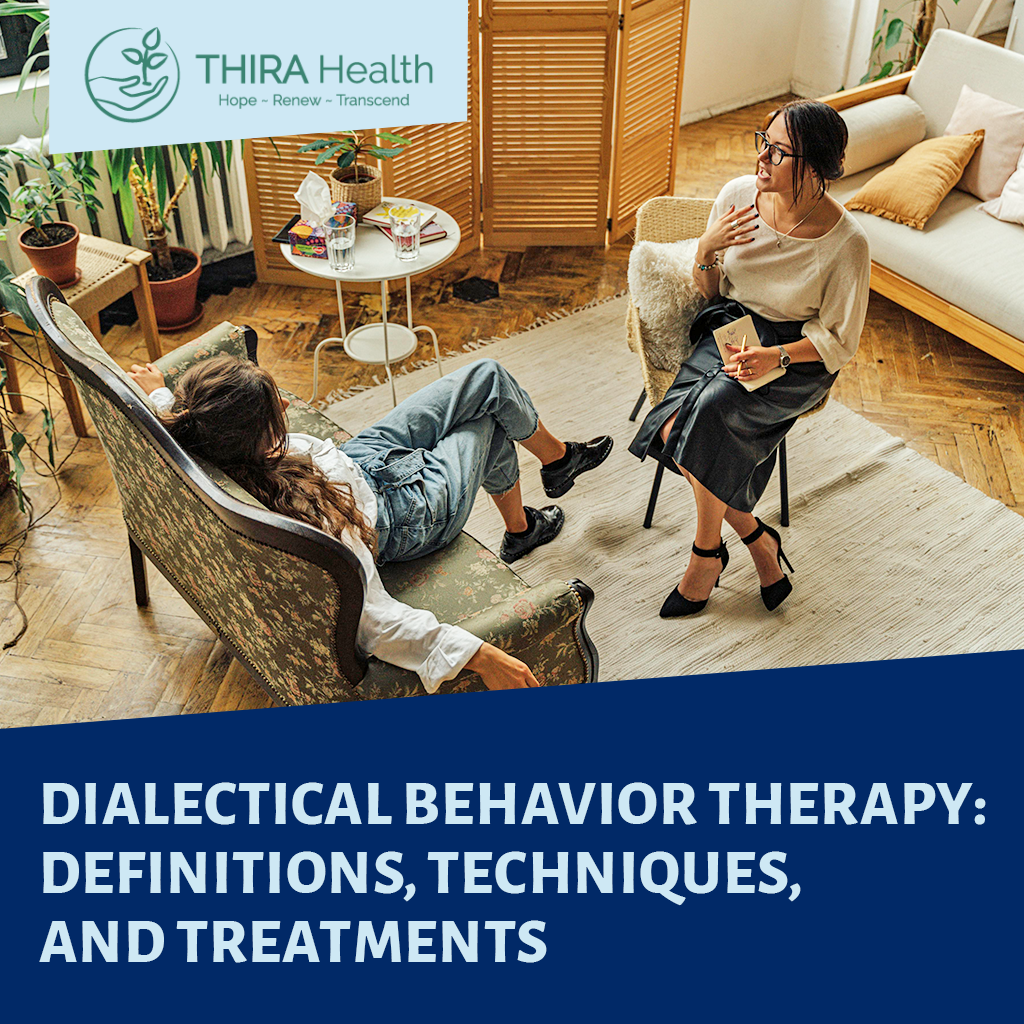What is dialectical behavior therapy?
Dialectical behavior therapy is a therapy structure that combines validation, acceptance, and life skills focused on interpersonal effectiveness, emotional regulation, mindfulness, and distress tolerance. DBT aims to help people change how they experience and respond to difficult and intense emotions and asks participants to incorporate dialectical thinking, or the concept that two opposing thoughts or feelings can be true at the same time, into their daily approach to the world. Walking the middle path between opposites and incorporating them both into your understanding of reality offers balance to replace extremes.
Instead of getting stuck in cycles of emotional overwhelm, the subsequent reactions, and eventual shame that can derail your life and escalate your distress, an intensive mental health treatment program that uses DBT can help you shift your behavior patterns to ones that offer you enough mental space and self-awareness to choose your responses to thoughts or emotions.
What mental health conditions does DBT help treat?
DBT was developed by Marsha Linehan in the late 1970s specifically to help with borderline personality disorder (BPD) by addressing BPD’s severe mood swings, strong emotional reactions, self-destructive and suicidal tendencies, and unstable interpersonal relationships. Since DBT was developed, it’s proven effective in helping people with depression, anxiety disorders, eating disorders, substance use issues, self-harm and suicidal behaviors, and PTSD.
What sets DBT apart from other therapy modalities?
Dialectical behavior therapy was adapted from principles of cognitive behavior therapy (CBT) specifically to help people who experience extreme and overwhelming emotions. DBT is a therapy modality that focuses on taking action and changing behaviors. From these changes in behavior come changes in how you experience your thoughts and emotions, making them easier to cope with, regulate, and understand.
In the words of DBT creator Marsha Linehan, “You can’t think yourself into new ways of acting; you can only act yourself into new ways of thinking.” – Building a Life Worth Living by Marsha M. Linehan.
The four pillars of DBT: mindfulness, emotional regulation, distress tolerance, and interpersonal effectiveness
In DBT, a suite of skills has been developed to help people manage their behavior in response to difficult emotions and thoughts. These life skills have been divided into four main categories, serving as foundational pillars to create a life worth living.
Mindfulness
Mindfulness means paying attention only to what’s happening here and now, staying present in the current moment. It also encourages non-judgment, recognizing that thoughts and feelings aren’t inherently good or bad. This approach to life can release you from the fear, shame, and worry that comes with too much attention to the past or the future.
Mindfulness example:
In difficult life situations, the Wise Mind DBT skill encourages you to find a balance between your emotional mind and your rational mind, tapping into your wise mind to help you make decisions.
Emotional regulation
Understanding what you’re feeling, why you’re feeling it, and how you want to respond to it can help you better regulate your emotions and your behavior in response to your emotions.
Emotional regulation skill example:
The DBT skill of Opposite Action encourages you to do the opposite of what an emotion pushes you to do. If your reaction to an emotion is to want to yell, for example, deliberately speak softly instead.
Distress tolerance
Life will always have difficult moments. How you choose to behave during those moments, including self-soothing, focusing on things you enjoy, and using body chemistry to your advantage, can help you either reduce how much distress you’re experiencing or make it easier to tolerate the distress.
Distress tolerance skill example:
The IMPROVE DBT skill reminds you of 8 different ways you can reduce distress (even just briefly) and improve the moment, including imagery, creating meaning, prayer, relaxation, finding one good thing, vacations (even in your head), and encouragement.
Interpersonal effectiveness
Our interpersonal relationships are crucial to living a satisfying life, and patterns of strong reactions to overwhelming emotions can derail relationships over and over. You might have a tendency to over-agree and abandon yourself or remain rigid in your boundaries, but DBT can help you develop a dialectical approach to interpersonal interactions, ensuring you maintain your self-respect, while also showing others respect, even in conflict.
Interpersonal effectiveness skill example:
The FAST DBT skill maintains your self-respect and respect toward others, encouraging you to be fair, make no (excessive) apologies, stick to your values, and be truthful.
DBT has a unique structure that provides support, community, and life skills
DBT is a robust therapy modality that combines individual therapy, group therapy, on-call therapist support, and a consultation team for your therapist.
In individual therapy, you’ll develop your self-awareness, learning about your emotional patterns and their origins. From there, you’ll decide with your therapist what your values are and what changes you’d like to make, and you’ll learn DBT skills to empower you to live the life you want.
In group therapy, you’ll practice your DBT skills with fellow therapy attendees. This built-in community offers you space to feel understood and seen, and to safely explore changing how you relate to others to build strong, healthy connections.
On-call therapist support means you’ll have access to your therapist if a crisis arises in everyday life. This helps you feel safe as you start to change your behaviors in response to emotion and thought patterns; you don’t have to go through everything alone, and support is there when you need it.
Finally, by working with a community of DBT therapists, your therapist can tap into a supportive wealth of experience and knowledge, offering inspiration and ideas, and helping them work through roadblocks to provide the best treatment possible.
How does DBT fit into a holistic mental health treatment program?
DBT readily fits into holistic mental health treatment, both because of its structure and the comprehensiveness of DBT skills. DBT skills have a built-in holistic structure because they recognize that both the body and the mind influence our behavior. Certain skills emphasize taking care of your body or using body chemistry to help you, while other skills engage the mind and offer validation and emotional balance.
Additionally, because DBT includes a therapy structure that offers individual and group support, alongside support outside the therapy space, it can be readily integrated into a holistic approach to intensive mental health treatment. Group therapy can be extended into holistic group activities like creative expression therapies, community involvement and volunteering, mindful movement such as yoga, group meals that include nutritional education and support, and family engagement. Individual therapy can also incorporate nutritional counseling, movement, and breathwork on top of the mental health aims inherent to DBT.
THIRA Health uses DBT as part of their holistic approach to intensive mental health treatment
Overall, DBT already exists as a holistic approach to intensive mental health treatment, and it can readily enhance additional holistic therapies. If you’re looking for mental health treatment that uses DBT alongside additional holistic approaches to mental wellbeing, THIRA Health may be a good fit. Connect with us today to see how our residential therapy programs, partial hospitalization programs, and intensive outpatient programs help men, women, and teen girls and gender nonconforming individuals to create a life worth living!






